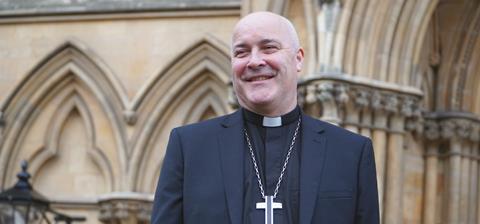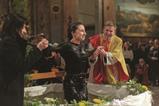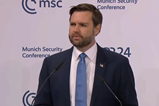The Archbishop of York recently called the Lord’s Prayer ‘problematic’ because it refers to God as ‘Father’. Christians might like to debate the gender of God, but there’s a reason scripture uses the male pronoun, says Tony Wilson

“Problematic” was the word the Archbishop of York used to describe the Lord’s Prayer while addressing the General Synod of the Church of England last week. “For if this God to whom we pray is ‘Father’ – and, yes, I know the word ‘father’ is problematic for those whose experience of earthly fathers has been destructive and abusive, and for all of us have laboured rather too much from an oppressively, patriarchal grip on life”, the Most Rev Stephen Cottrell said.
His comments were spoken as an aside to the main thrust of his talk, which was about unity, but the conservative and liberal wings of the Church of England are on a hair trigger when it comes to points of tension like this. Commentators on one side were quick to own the Archbishop’s words by agreeing that the Church has abused others in its patriarchal history. On the other side, traditionalists pointed out that Jesus himself instructed us to pray in this way.
Gender neutral God?
Taking a step back, we must acknowledge that Genesis teaches that both male and female humans bear the image of God. In this sense, both sexes are needed to render a faithful representation of the person and character of God. Not only this, but God the Father has no body and so it simply makes no sense to call him male or female.
Throughout scripture we read many references to the female qualities of God;
- God comforts us like a mother (Isaiah 66:13)
- God hovers over us like a mother eagle (Deuteronomy 32:11)
- God cares for us like a midwife (Psalm 22)
To cite just a few.
But we also have to take into account that God chose to manifest his nature to us in the person of Jesus, who is clearly a man. Hebrews 1:3 leaves us in no doubt that we will find no more faithful representation of God the Father than by looking at Jesus the Son. And Jesus himself taught us to pray to God as Father, so we would need a strong warrant to go against this.
Some might argue that Jesus simply reflected the patriarchal dominance of his time, but this approach fails. Jesus demonstrates, throughout his ministry, an eagerness to overturn cultural taboos with respect to women in particular and to the wider values of his culture in general. Jesus was a radical dedicated to placing women at the heart of his mission and to giving them a wholly new value in his kingdom. If there were any warrant to address God as Mother then Jesus would have been the first to proclaim it.
The New Testament consistently casts the people of God (the Church) as female in relation to the male person of God. Collectively we are the bride of Christ who will one day be definitively married to him in the marriage supper of the Lamb. This is not an arbitrary choice on the part of God. His whole mission, through Jesus, was an act of self-donation and the qualification for salvation is to be openly receptive (Ephesians 5:25-27).
A sinful world
But what of the pastoral insensitivity that concerns the Archbishop? He is right to be worried for those who have suffered at the hands of an abusive father, or who have not been able to fulfil their vocation through a patriarchal church. Real damage has been done to real people and we must be sensitive to this.
Putting this in a wider context shows that we all, to greater and lesser degrees, suffer because we live in a sinful world. Think about the harmful attitudes and habits we have acquired simply by living in a hyper-consumerist society. What about the ravaging effect that social media has on so many of us? Many experience bullying and rejection at formative moments in our lives.
In short, we all come to God in need of a saviour and a healer. The fact that we are all broken in certain respects does not mean we should re-define the character of God to make our wounds appear less mortal. It is not pastorally sensitive to imagine God in a way that makes light of our human condition. The exact opposite is what is needed.
It is by coming to God, with his unchanging nature, that we see our scars and our sins for what they are. The bright light of his immutable character shines on to our souls in such a way that we can clearly see the healing, salvation and sanctification that needs to take place. Only then can we submit ourselves to his mercy and grace.
We can all agree with the Archbishop of York that some people carry deep wounds from the way men have hurt us in the past, but please let’s not change the Lord’s Prayer.




































